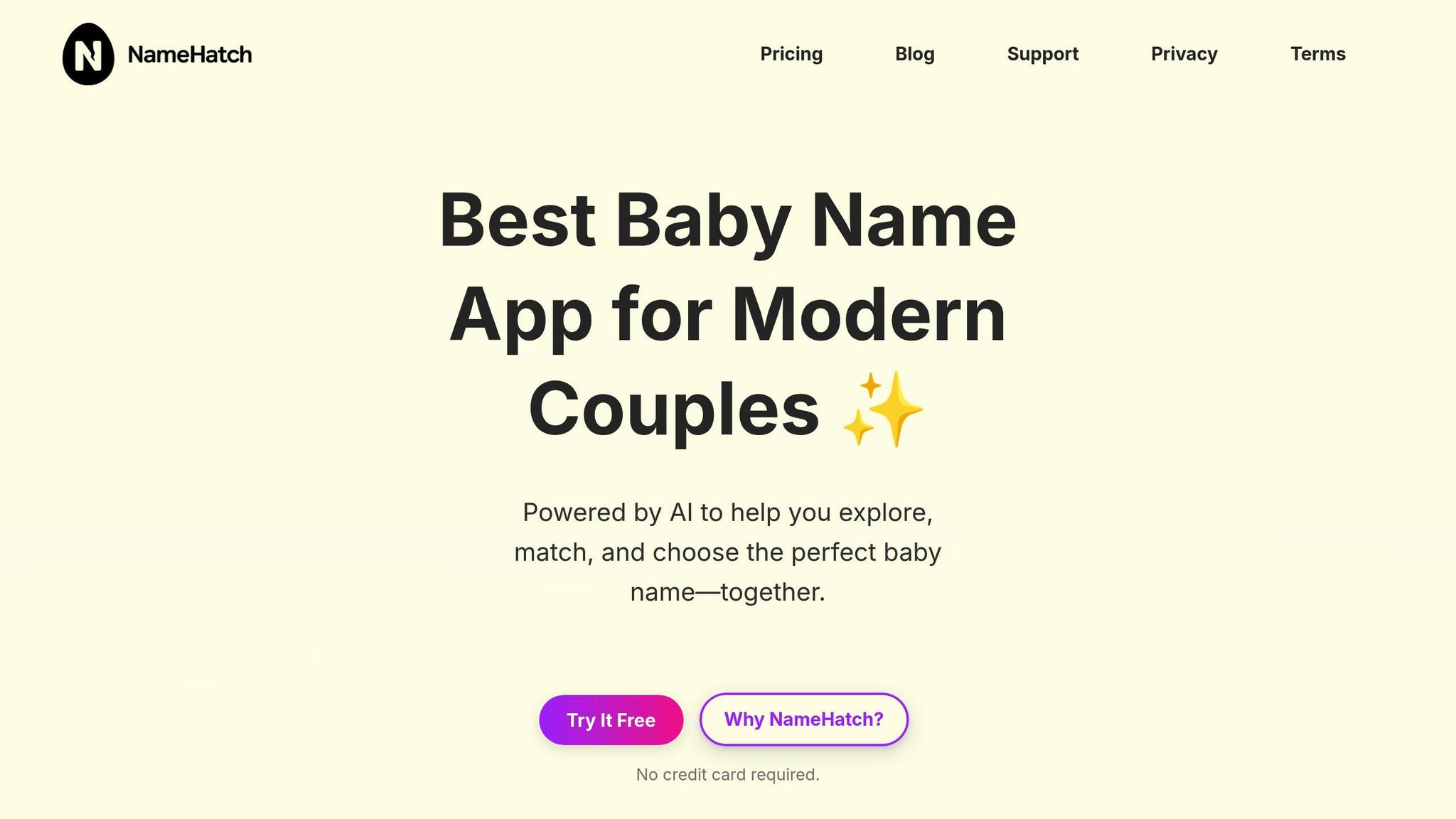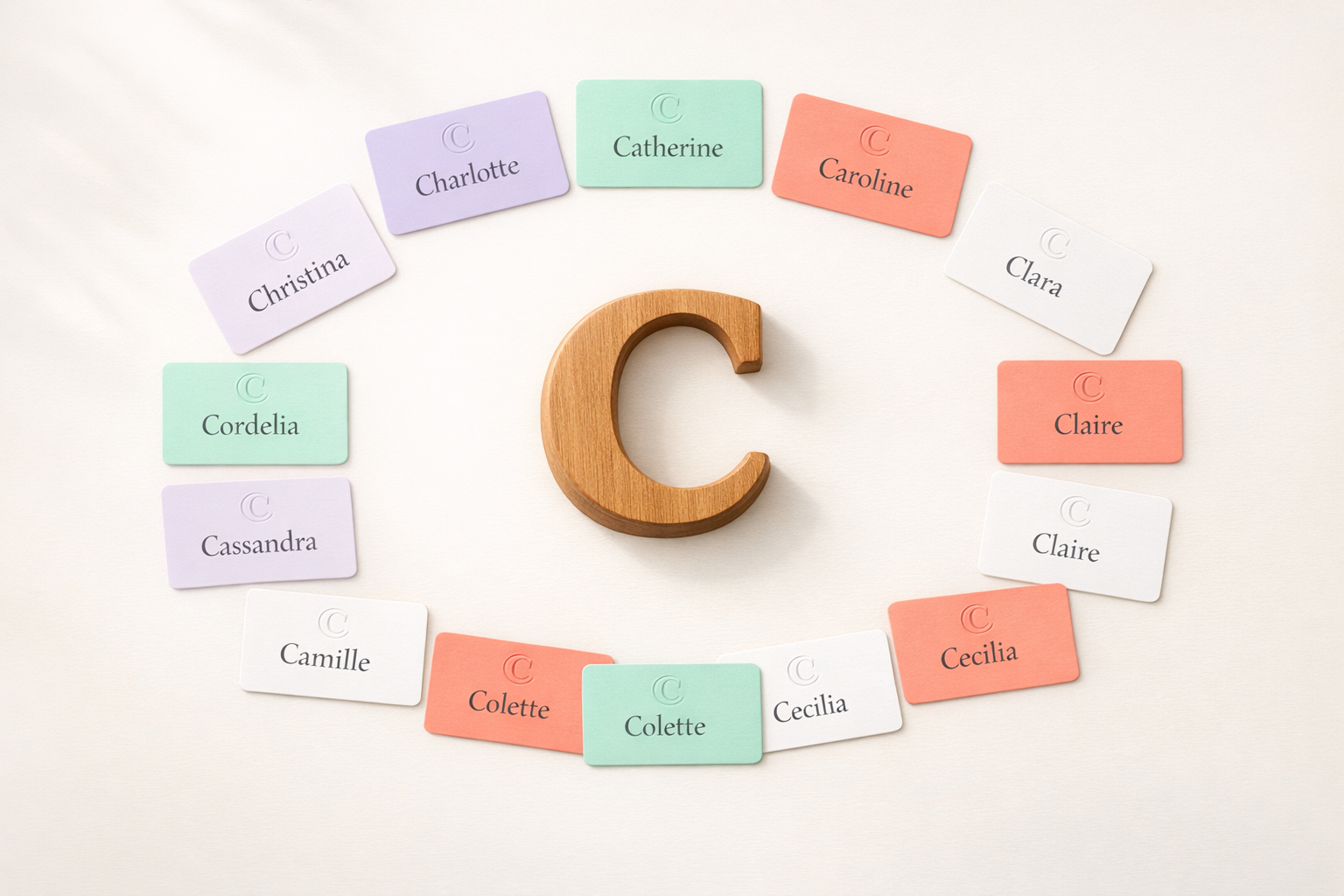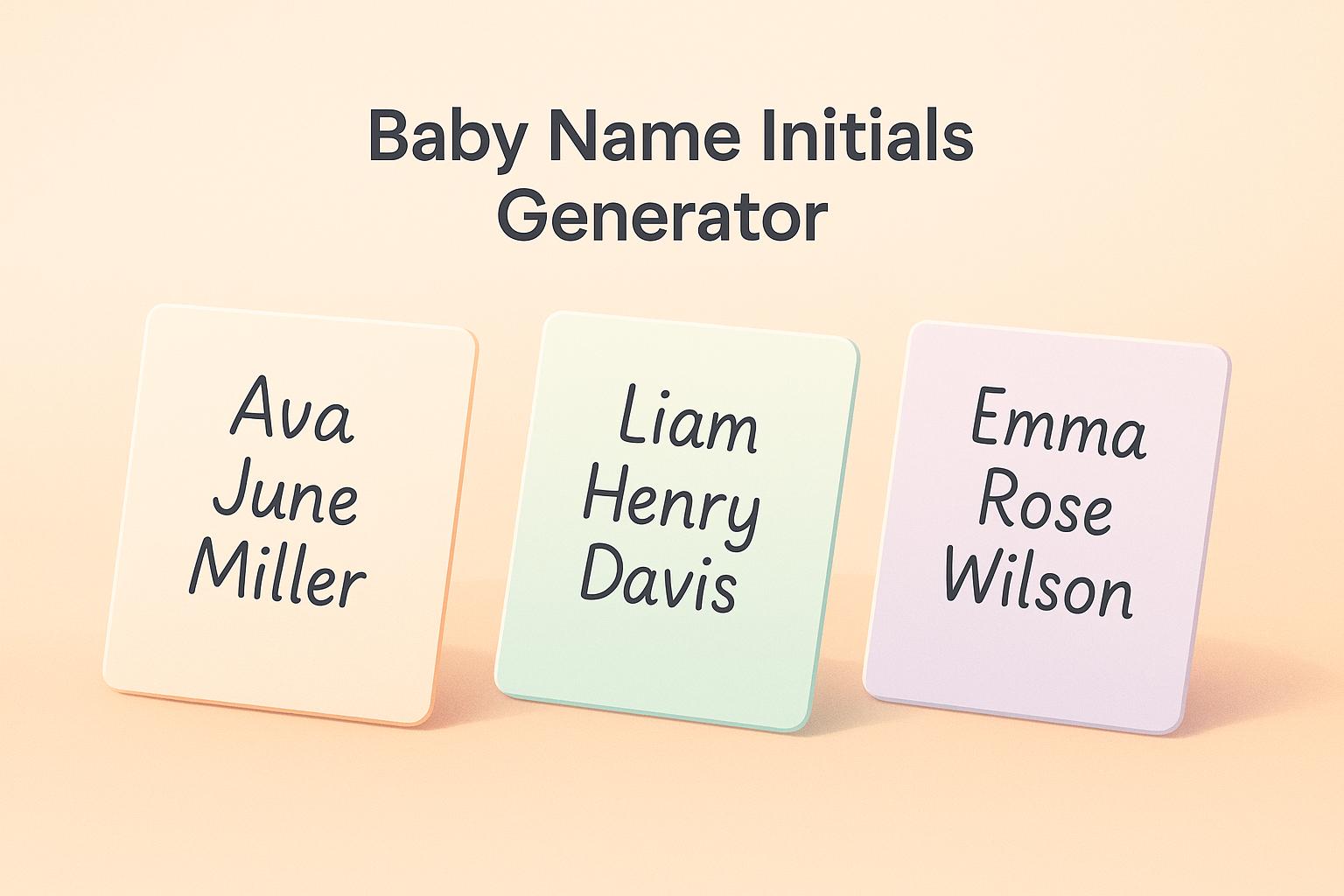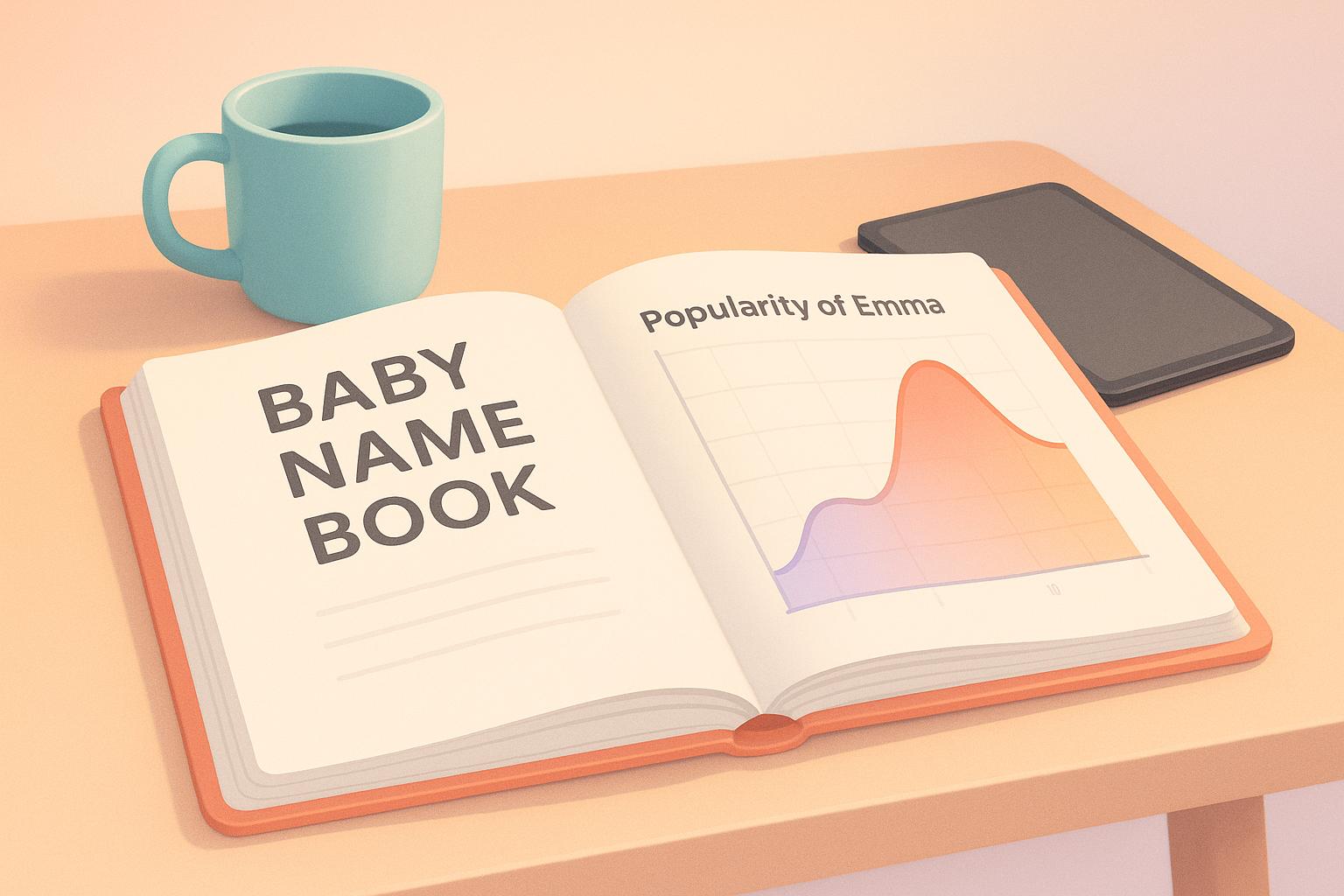Did you know 10-20% of parents regret their baby’s name? Baby name regret is the uncomfortable feeling that you’ve chosen the wrong name for your child. It can stem from reasons like the name becoming too popular, being hard to spell or pronounce, or developing negative associations over time. While most parents don’t talk about it, this issue is more common than you’d think.
Here’s what you’ll learn:
- Why name regret happens: Popularity, spelling/pronunciation issues, or bad associations.
- How to prevent it: Use timeless names, collaborate with your partner, and try AI tools like NameHatch.
- What to do if it happens: Yes, you can legally change your baby’s name or transition to a nickname.
Quick Tip: Tools like NameHatch can help you and your partner find the perfect name by suggesting ideas based on your preferences and avoiding common pitfalls.
Keep reading for answers to 15 common questions about baby name regret and practical steps to avoid or fix it.
The most regretted baby names | FOX 13 Seattle
Main Reasons Parents Regret Baby Names
Choosing a baby name is a big decision, and understanding common pitfalls can help avoid future regret. Studies indicate that about 9% of moms experience regret over their child’s name. By exploring these common reasons, you can approach the naming process with greater confidence.
Name Becomes Too Popular
A name that once felt special can lose its appeal when it becomes overly common. Parents who thought they had picked something distinctive often feel let down when it turns out to be everywhere.
"People are working a lot harder to come up with a name that is really distinctive and has a lot of personal meaning." - Pamela Redmond Satran
For example, one parent shared disappointment over Olivia's sudden rise in popularity. These trends can make a name feel less personal, leading to frustration.
Hard to Spell or Say
The structure of a name is just as important as its uniqueness. While creative spellings might seem appealing at first, they can lead to daily headaches. Research shows that 11% of parents regret choosing a name that’s difficult to spell or pronounce. In the U.K., 20% of parents later wished they had picked something simpler, and 8% expressed frustration over constant mispronunciations.
"You have the child named Jennifer spelled with a 'G' - her teacher says 'Are you sure your name is spelled that way?' That can be damaging to confidence." - Jean Twenge, U.S. Psychologist
Names with unconventional spellings can even affect a child’s literacy development. Beyond school, these challenges can extend into adulthood, impacting first impressions in professional settings.
Bad Associations Develop Over Time
Names can take on negative connotations as societal and cultural contexts shift. Media coverage, scandals, or personal experiences can turn a once-beloved name into a source of regret. High-profile crimes or controversies can tarnish a name’s reputation, and unusual names are especially prone to becoming tied to specific events or individuals.
"When a new person introduces himself to you (let's call him 'Spencer'), your first instinct is to form a mental image of everyone you have ever known named Spencer… You subconsciously judge this new Spencer, at least a little, based on all the other Spencers you have ever known." - Michael Hedrick
Research highlights how names can influence perceptions. For instance, names associated with lower socioeconomic backgrounds often lead to biased assumptions. A study involving 130 elementary school teachers found that children with African-American-sounding names were judged to have lower academic potential compared to those with Caucasian-sounding names. Similarly, resumes with African-American-sounding names received 50% fewer callbacks, and children with the most distinctive African-American names faced higher risks of social and academic discrimination. These evolving associations show why thoughtful collaboration and research are essential when choosing a name.
How to Prevent Baby Name Regret
Avoiding baby name regret starts with open communication, thoughtful decision-making, and using the right tools. While most parents - 91%, according to research - would choose the same name again, careful planning can help ensure you're confident in your choice from the start.
Work Together and Communicate
Baby names can stir up strong opinions, and it's no surprise that half of parents surveyed by BabyCenter admitted to disagreements with their partner over naming choices. The key to resolving these differences is empathy. Try to see things from your partner's perspective and understand that their preferences aren't a rejection of your ideas - they're just deeply personal. Instead of letting disagreements turn into roadblocks, approach the process as a team.
If you're stuck, take a step back. Giving yourselves time - especially early in pregnancy - can help both of you refine your preferences naturally. Tools like NameHatch’s partner matching feature can also ease the process by highlighting shared favorites, making it easier to find common ground and settle on a name you’ll both love.
Choose Classic Names Over Trends
Timeless names have a way of standing the test of time, while trendy ones can lose their appeal as styles shift. Classic names bring flexibility, working well for both childhood and adulthood. For example, nature-inspired names like Hazel, Iris, Ivy, Olive, Pearl, Ruby, and Violet strike a balance between charm and individuality.
"The best course of action is to choose a name that a child can grow into as an adult." – Nikki Ourand Lambert
When deciding, think beyond the baby years. Consider how the name will sound on a professional resume, what nicknames it might inspire, or even how pairing a unique first name with a more traditional middle name could provide balance. A little foresight can go a long way in helping your child feel confident with their name at every stage of life.
Use AI Tools for Personal Suggestions
Technology can be a game-changer when it comes to narrowing down baby name options. Tools like NameHatch use AI to analyze your preferences and suggest names that align with your style. You can filter options by characteristics like classic versus modern or soft versus strong sounds. For those seeking something more specific, premium filters allow you to explore categories like nature-inspired, global, or mythical names.
The swipe feature makes it easy to review names quickly and save your favorites, while partner alerts create moments of shared excitement when you both like the same name. Plus, with cross-platform compatibility, you can keep exploring names anytime inspiration strikes.
sbb-itb-f13f980
15 Questions About Baby Name Regret
When baby name regret sets in, it often brings a flood of questions and uncertainty for parents. Below are some common concerns parents face, along with practical advice to help navigate this emotional experience. Tools like NameHatch can be invaluable in guiding your decision-making process.
Can I Still Change My Baby's Name?
Yes, you can. Changing your baby's name is possible through a legal process or by gradually transitioning to common usage.
For a legal name change, you'll need to file a petition with your local court. The process varies by state and typically includes filing fees, though many states offer fee waivers for those who qualify. To get started, contact your local county court for specific instructions.
Psychologist and relationship expert Dale Atkins highlights the importance of timing:
"Names are very important to one's sense of self and identity, so it's best to make any changes while your child is still a baby or, at the very latest, before she turns 2. Otherwise, it can be quite confusing for her."
Interestingly, a Nameberry study found that 8% of parents who experienced name regret went on to legally change their baby's name. If hiring a lawyer isn't an option, you can often manage the process on your own, though professional assistance can simplify the paperwork.
What If My Partner Hates the Name?
It's not unusual for partners to disagree about baby names. If your partner dislikes the name, it’s not necessarily a rejection of your choice - it’s often tied to their own feelings about what fits your child best. Take the time to understand their concerns and the reasoning behind their objections.
NameHatch's partner matching feature can help. Instead of endless debates, both of you can independently swipe through names, and the app will notify you when you both like the same one. It might even suggest names you hadn’t considered, offering fresh options that work for both of you.
The goal is to find a name that reflects mutual respect and makes both of you feel heard, even if it means compromising on your initial choice. Once you’ve addressed your partner’s concerns, think about how the name will resonate as your child grows.
How Do I Know the Name Will Fit My Child?
You won’t know for sure until you start using it. Try saying the name out loud in everyday situations - introduce your baby with it, imagine calling it across a playground, or picture it on a professional resume. Testing the name for a few weeks can help you see if it feels natural and fitting.
Also, think long-term. A name that suits your baby now should also work for them as an adult. Consider potential nicknames and how the name might evolve over time.
Postpartum emotions can sometimes heighten feelings of uncertainty. If you’re dealing with postpartum depression or anxiety, these emotions might amplify your doubts about the name. Reflect on whether the regret stems from the name itself or from other challenges you’re facing.
If the name still doesn’t feel right after some time, remember that changing it is always an option. Name changes are more common than you might think, and what truly matters is choosing a name that brings your family comfort and confidence.
Leveraging tools like AI suggestions and partner matching from NameHatch can help you make a choice that feels right both now and in the years to come.
How Modern Tools Prevent Name Regret
Today’s technology makes it easier than ever for couples to pick a name they’ll love and avoid second-guessing their decision. Tools like NameHatch use artificial intelligence and collaborative features to help parents feel confident from the beginning. Let’s dive into how AI suggestions, partner collaboration, and smart filters simplify the naming process.
AI Name Suggestions
NameHatch’s AI taps into global databases and analyzes decision-making patterns to suggest names that align with your preferences. By factoring in your inputs - like family traditions, cultural background, and specific keywords - the AI offers tailored recommendations while steering clear of overly popular options or common pitfalls.
Think of it as a brainstorming partner: it provides inspiration, but the final choice is always yours. As naming expert Jennifer Moss puts it:
"Choosing a baby name is a deeply personal journey – AI can help you explore the possibilities, but trust your instincts and heart to land on the name that feels just right for your growing family."
Partner Features for Joint Decisions
One of NameHatch’s standout features is its partner matching tool, which allows both parents to swipe and select names independently. When you and your partner both like the same name, the app notifies you. This approach not only speeds up the decision-making process but also minimizes disagreements by ensuring both voices are heard - without the stress of face-to-face debates. You can also share, rate, and eliminate options together, making the process collaborative and stress-free.
Smart Filters for Quick Results
The app’s smart filtering system is designed to make long lists manageable. Using both basic and premium filters, you can sort names based on origin, gender, popularity, or specific themes. By breaking options into smaller, focused categories, these filters help you avoid feeling overwhelmed and allow you to zero in on names that truly resonate with you.
Conclusion: Make Better Choices with NameHatch

Choosing a baby name doesn't have to lead to regret. The secret lies in careful planning and open communication between partners. When couples rush the process or neglect to share their preferences, it often leads to second-guessing down the line.
NameHatch tackles these challenges head-on by creating a space where both partners can collaborate equally. Its system simplifies the decision-making process by merging both partners' ideas, ensuring every voice is heard. This turns what could be a stressful task into a shared, enjoyable experience.
With a detailed name database and customizable filters, NameHatch helps you find names that align with your family's values and heritage.



